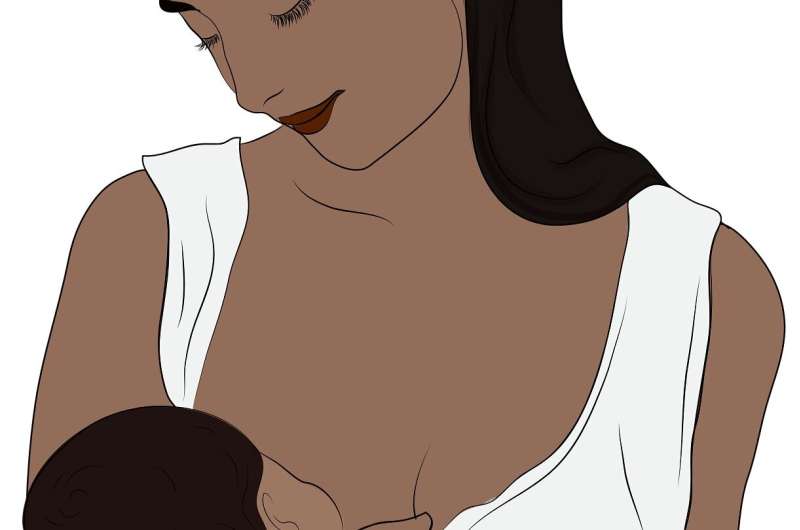This article has been reviewed according to Science X's editorial process and policies. Editors have highlighted the following attributes while ensuring the content's credibility:
fact-checked
peer-reviewed publication
trusted source
proofread
Researchers identify molecules associated with low breast milk volume

The volume of breast milk produced may be determined by genetics, according to biomedical and nutritional sciences Professor Shannon Kelleher of the UMass Lowell Zuckerberg College of Health Sciences.
Analyzing the breast milk of 221 mothers aged 19 to 42, she and her research team identified molecules that may be responsible for regulating milk volume. Results of the study, recently published in the journal Nutrients, shed light on the role of miRNAs, which regulate gene expression.
"Our study shows a miRNA called let-7g-5p is significantly higher in the first week of lactation of women who have a low milk supply, compared to those who have an adequate supply," said Kelleher, who conducted the research with colleagues from Penn State College of Medicine as well as UMass Lowell students.
Kelleher and the research team believe breast milk can be used as a "liquid biopsy" of the lactating mammary gland to understand whether the gland is working properly.
"By measuring milk levels of let-7g-5p during the first weeks after birth, caregivers could identify women who need additional lactation support," she said. "These interventions may include dietary changes, lactation consultant support, medications and therapy."
Biomedical engineering and biotechnology master's student Anna Ward, who co-authored the paper, demonstrated in cultured mammary cells in vitro that elevated levels of let-7g-5p are associated with low milk supply.
"This is an exciting avenue for future research because of its potential role in maintaining optimal breast function and adequate milk supply," said Ward, who earned her undergraduate degree in applied biomedical sciences at UMass Lowell in 2020. "By understanding biological factors that contribute to low milk supply, we can look for ways to target or modify these factors."
One of the opportunities for improvement may be in the diet, added Kelleher. The researchers assessed the diet of mothers who participated in the study and discovered low fruit intake was associated with high let-7g-5p levels and low milk volume. This suggests to Kelleher and her team that polyphenols, a family of compounds found in fruit and vegetables, may modulate levels of let-7g-5p.
"Increasing fruit intake could make a big difference to mothers who want to nurse their babies," said Kelleher.
Under the direction of Kelleher, applied biomedical sciences student Serena Burkinshaw is studying the effect of polyphenols on mammary cells for her honors project.
"I have been working with Dr. Kelleher on a literature review on the effect of polyphenols on women, animal models and mammary cells in culture," said Burkinshaw, who plans on continuing as a master's student in the applied biomedical sciences program and eventually working for a pharmaceutical or biotechnology company.
"We are examining the effect of grapeseed extract, which contains a variety of polyphenols, on mammary epithelial cells to understand the mechanism by which polyphenols may affect let-7g-5p levels and milk supply."
More information: Steven D. Hicks et al, Human Milk-Derived Levels of let-7g-5p May Serve as a Diagnostic and Prognostic Marker of Low Milk Supply in Breastfeeding Women, Nutrients (2023). DOI: 10.3390/nu15030567




















